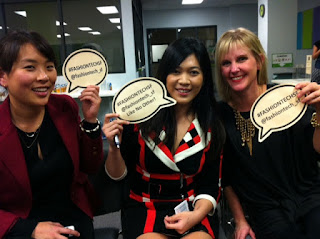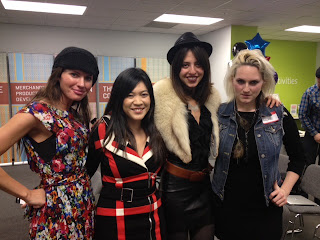Hi all,
My name is Karen Song and I am a female entrepreneur living in Silicon Valley. This past weekend was my first Women 2.0 Startup Weekend experience-- and it was so powerful that I am starting a blog just to talk about it.
Let me start off by saying- I don't relate to women very well. I attribute this to several possibilities. This may sound strange-- but I can actually go for days without seeing another female because I work with males and then come home to my boyfriend. I am also strangely intimidated by women and the feminine expectations imposed upon women. I'm not particularly verbose or well-spoken, smiling in a pleasant manner and validating other people's opinions hurts my face after a while, and attempting to speak in a high-pitched, friendly manner feels incredibly unnatural. I find that without these social niceties, I come across as gruff and offensive to the average female and therefore I am horribly shy about all-female events.
So imagine my despair when I walked into the hatchery to a crowded, noisy roomful of lots and lots of women (this is an absolute rarity in Silicon Valley). Pitches were about to start, so I thought of an idea for a fashion start-up and got in line. Alas, no one wanted to join me in my venture but I ended up merging together with a crew of other girls who were also interested in starting fashion start-ups. Again, I was shy- these girls were bubbly, out-spoken, articulate and polished--so I let other group members take control of the discussion.
In addition to gender expectations and where I fit on the spectrum, I've also thought a lot about my silence. I attribute my silence to several possibilities.
A) Natural predilection and genetics: my grandfather was notoriously quiet and would sit through the majority of our family gatherings without uttering a single word. Sometimes I would even forget that he was there.
B) My aversion to small-talk. I actually like talking about things that matter to people and contrary to what most people think, I actually enjoy conversation if it is meaningful and relevant (then I never shut up). Unfortunately, most discussions never reach that point and "breaking the ice" or "shooting the shit" is what most large groups of people are most interested in doing.
C) The most disturbing reason of all: Self-doubts about my intelligence and aptitude.
In addition to the strange gender ratio, I believe this last reason I cited is something that many women in Silicon Valley experience. It takes practice for a woman to assert her voice and command authority without feeling uncomfortable, guilty, unsure, etc. etc. because to some degree it has been entrained in us by society. I actually attended a talk that Sheryl Sandberg gave about this very subject- she literally gave "voice" recommendations where she implored us to stop ending declarative sentences with a question mark (e.g. "I think we should deliver this power point next week?") and inflecting our voices with apologetic insecurity in order to feign niceness.
Personality wise, it takes a lot for me to throw my thoughts "out there." My thoughts are valuable to me- not to be trampled upon by others. And unfortunately, the culture in Silicon Valley makes me want to hold onto my thoughts all the more tightly to myself. They say that sexism in Silicon Valley isn't blatant but it is there-- on multiple occasions, I have doubted my intelligence and aptitude because of an unpleasant interaction with a condescending male where my voice was literally bull-dozed over with a constellation of overwhelming facts and rationalizations. Sadly, I never experienced this before coming to Silicon Valley. There were always various reasons for my silence, but this wasn't one of them. I was always smart, confident in my quiet, industrious nature, and bold when it came to advocating for things that really mattered to me. But here, I find myself uncharacteristically quiet. Quiet not because of my personality, but quiet because I'm afraid.
And so it was with trepidation that I inched my way into this group of girls and began exercising my voice. Like a squeaky wheel that hasn't been oiled in a while, my voice sounded awkward to me at first. It felt unnatural to just say things and express an opinion to nine people without wanting to take it back. But over the course of those 72 hours, I found my voice becoming stronger and stronger. Stronger because there was a place to exercise it, and stronger because people were listening. There are communicative differences between the way women and men relate to each other and being amongst a group of women was surprisingly refreshing. These women were collaborative and cooperative. I didn't feel like I necessarily had to be "right." Mu passion for the project overcame any shyness and I began to make suggestions. The group even looked to me for advice and leadership on aspects of the project (given my previous experience at another start-up weekend event). And in the end, I was so proud of the work we had done and the concepts we had built together as a group.
We didn't win, but it was a treat just to see the amazing work that other teams were able to accomplish in such a short period of time. Women from all backgrounds- high schools drop outs, non-technical women, technical women, self-labeled Ivy League "douchebags"-- put their heads together to deliver amazing presentations and creations. Mobile apps that help women to feel safer walking home late at night and record people's life stories and interactive language learning programs are just a few of the cool ideas that people presented. The take home lesson that I learned from all of this speaks to the ethos of this area and the Gold Rush-- it doesn't matter where you come from, who you are, what you do, or what your resume says-- the beauty of Silicon Valley is that you can be anybody and still build something amazing.
Women 2.0, Startup Weekend, and this group of girls restored something incredibly valuable to me- my confidence. Confidence in my abilities, confidence in my femininity, and confidence in my ability to build positive relationships with other women.
Can't wait for the next event!
Karen was part of the Stylematic team, a group working on developing a mobile app that delivers personalized style recommendations for what shoppers should buy based on what's already in their closet as well as their personal style. We merged together into a group since we all wanted to pursue fashion start-up ideas. The Stylematic refined its idea after doing a creative ideation exercise where we grouped colored post it notes with user stories and problems by category.






